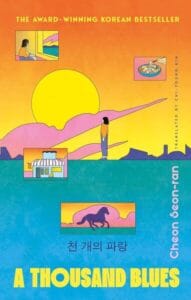Initially evoking the sterile chill of a dystopian sci-fi tale, with horse-riding jockey robots and humans replaced by automation, Cheon Seonran’s A Thousand Blues quickly reveals itself as something far richer: a thoughtful exploration of humanity’s uneasy coexistence with technology, as well as the contradictions of a society that both creates and undermines its own systems of care.
Set in a near-future Korea in a remote area of Gyeonggi-do, a sprawling province that encircles Seoul, blending satellite towns, farmland, and the outskirts of metropolitan sprawl where robots increasingly displace human labor. The novel centers on C-27, a jockey robot. Unknown to his manufacturers, C-27 was mistakenly installed with a cognitive chip, granting him an unusual capacity for learning and curiosity. This chip sets him apart from other robots, allowing him to notice things like the blue of the sky—an act of wonder that ultimately leads to his downfall. During a race, C-27 looks up at the sky, loses balance, and falls, only to be trampled by the other horses, leaving his lower body destroyed. Sold, through a legal loophole after the accident, he is purchased and repaired by Yeonjae, a bright but somewhat aloof high schooler with a talent for robotics. After being fired from her convenience store job and replaced by a robot clerk named Betty, Yeonjae gives C27 the name “Coli” because of its color, similar to broccoli.
The story also centers on a quiet yet powerful quest: to save Today, the horse that Coli once raced. Once a star that brought significant revenue to the racetrack, Today’s health deteriorates after Coli’s accident, and at just three years old, she faces euthanasia. Everyone tries to help save her, reinforcing the book’s exploration of empathy and survival in a system that discards the weak.
By giving each major character, Yeonjae, her sister Eunhye, their mother Bogyeong, the stable guard Minju, the veterinarian Bokhui, and Coli, a chapter or more named after them, Cheon invites readers to inhabit multiple perspectives. This structure reinforces the idea that no single viewpoint can fully capture the complexities of a human. Even Coli, though ultimately a machine, embodies curiosity and reflection, rendering him a more empathetic figure than many of the humans who seek to control him.
Beyond its technological premise, this book is a multi-layered examination of social issues, deftly weaving in topics such as disability, single parenting, animal rights and the burden of caregiving. For example, Yeonjae’s sister Eunhye lives with polio, and the novel poignantly captures how disability reshapes not only the life of the individual but also the emotional landscape of the entire family: “Eunhye stopped asking for things, and Bogyeong—her mother—stopped saying no to her.”

A Thousand Blues also critiques the human-centric worldview that justifies the manipulation of the environment and the commodification of other species. The vet Bokhui in one passage notes how “animals could only exist if humans needed them and protected them,” a chilling reminder of the exploitative relationship humans often have with the natural world. In this society, relationships, whether between people or with animals, are transactional: once a bond ceases to be useful, it is severed, reflecting modern anxieties about disposability and social hierarchy, themes that resonate globally.
The prose remains captivating; even in translation, it balances vocabulary such as “resplendent”, “bereft” and “maudlin” with occasional, well-placed bursts of profanity that feel organic rather than vulgar. A perfect example is Yeonjae’s dry, biting lines.
This linguistic versatility allows her to shift seamlessly from philosophical reflections to raw human emotion, capturing both the grandeur and the grit of her imagined future. Although rational and unsentimental, the story never feels cold; instead, its honesty about shared struggles offers a refreshing, even comforting, realism that acknowledges pain without masking it.
In the end, A Thousand Blues is not a cautionary tale about robots, but rather a nuanced examination of a world where technology quietly infiltrates every aspect of life, amplifying existing social contradictions. It asks what it means to be useful, to be disposable, and ultimately, to be human in a world where even the boundaries between living and non-living blur. This novel is a compelling example of contemporary Korean fiction, inviting readers to consider the price of progress and the fragility of empathy in an age of relentless automation.


You must be logged in to post a comment.